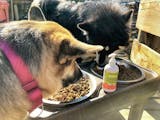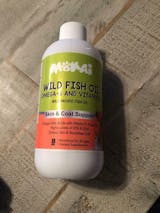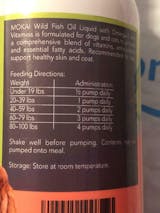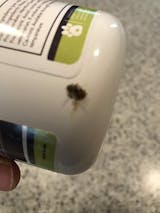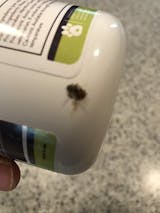When you have Thanksgiving dinner with your family, you probably think of sharing some of the delicious dishes with your pup. But since you are also a responsible pet parent, you don’t want to give them something that will harm them. Is the delicious cranberry sauce your father-in-law made one of those harmful dishes for your dog? Let’s find out.
Can dogs eat cranberries?
Let’s do things right and start from the beginning. Before knowing if dogs can eat cranberry sauce, we should know if they can eat the plain raw fruit.
The good news is cranberries are safe for dogs to eat in small quantities. But there are some things you should keep in mind before feeding cranberries to your pup:
- Cranberries are not recommended for small dogs since they can represent a choking hazard.
- If you are planning on giving cranberries to your dog, always give them fresh cleaned cranberries bought from the store. Don’t give them the ones that come on fruit mixes since these products can contain toxic fruits for dogs such as grapes.
- The same applies for dried cranberries. Although they are safe for dogs to eat, if you give them the ones that come in a mixed bag, you have the risk of giving your pup raisins, which are not safe for them to eat.
If you want to learn why grapes and raisins are toxic for dogs, you can read this article.
Is cranberry sauce good for dogs?
Now that we know dogs can eat cranberries with only a few limitations, let’s jump into the question that brings us here today: can dogs eat cranberry sauce?
The answer is yes, dogs can eat cranberry sauce. BUT there’s also a strict guideline for feeding cranberries to your dog, that must be followed to the letter. Otherwise, cranberries can represent severe risks for your pup.
The cranberry sauce you buy at the store is definitely not the one to give to your dog because it can contain many ingredients that are not safe for your pup to eat, such as:
- Sugar: commercial cranberry sauce tends to have a high percentage of sugar, which can lead to gastrointestinal problems and contribute to obesity, a disease that affects many dogs in the USA and has a long list of negative effects on their health.
- Raisins and grapes: that’s right, many canned cranberry sauces can contain these toxic ingredients for dogs.
- Alcohol: some brands of cranberry sauce also contain a small amount of alcoholic beverages such as brandy, which is toxic for dogs.

To summarize, before feeding commercial cranberry sauce to your dog, make sure to read the ingredients and look for one that only has cranberries, orange or raspberry juice, and a small amount of sugar.
And what if you prepare the cranberry sauce for Thanksgiving yourself, can you feed it to your pup? Well, once again, it all depends on the ingredients you add to it. If you want to share your cranberry sauce with your dog, make sure to make it as natural as possible: with the least amount of sugar and with only some orange or raspberry juice.
The truth is that cranberry sauce it’s not the best treat for your dog, raw cranberries are a healthier option, with fewer risks. Nevertheless, it all comes down to your dog and their taste. If they don't like cranberries, which happens to many pets, they won’t eat it in any form.
Do cranberries have health benefits for dogs?
Cranberries are not only safe for dogs to eat in moderation, but they also present a number of health benefits for pups:
- Antioxidants: cranberries are rich in antioxidants that reduce chronic inflammation, act against allergies and boost cognitive function.
- Low calories: another great benefit of cranberries is that they are low in calories, so they represent a healthy snack for overweight and diabetic pups. But this is only the case for raw cranberries, not for the sauce that has a high amount of sugar.
- Fiber: it aids your dog’s digestive system and makes them feel satisfied for a longer period of time.
- Vitamin C: it helps improve your dog’s immune system and prevent respiratory illnesses and bacterial infections.
- Minerals: cranberries contain a wide range of minerals such as potassium, iron and manganese that have many benefits for dogs, such as helping with the production of fatty acids and aiding in growth and metabolism.







